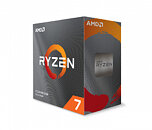Tuesday, June 16th 2020

MSI Confirms Ryzen XT "Matisse Refresh" Clock Speeds
MSI confirmed the clock speeds of the upcoming Ryzen 9 3900XT, Ryzen 7 3800XT, and Ryzen 5 3600XT processors on its website. The CPU support tab in the product page of the MAG B550 Tomahawk motherboard lists out clock speeds of the three processors. The nominal clock speeds of the 3900XT, 3800XT, and 3600XT are identical to those of the 3900X, 3800X, and 3600X, respectively, as are their TDP ratings. What the table doesn't list are boost clocks. AMD has reportedly increased the max boost frequencies of the three new chips by 100-200 MHz over those of the 3600X, 3800X, and 3900X. The 3900XT and 3800XT reportedly feature 4.70 GHz boost clocks, while the 3600XT ticks as fast as 4.50 GHz. As for prices, the 3900XT is expected to launch at $499 (launch MSRP of 3900X), the 3800XT at $399 (launch MSRP of 3800X), and the 3600XT at $249 (launch MSRP of the 3600X). The 3900XT and 3800XT ship without coolers, just like the 3950X.
Source:
VideoCardz


18 Comments on MSI Confirms Ryzen XT "Matisse Refresh" Clock Speeds
It settled at 1.25v and around 65C. I think I got lucky because most people will have to run with 1.35v to hit 4.3ghz.
I’ve never seen my 3900x runs at base frequency. It either boosts up to 4.7 ghz on single threaded task briefly or hoover around 4.18 ghz in most cases.
With the XT, better binning will allow faster frequency but silicon lottery is still at play here. Some chips will exceed the thermal envelope of the stock coolers in some countries with higher ambient temperature, so it’s safer to not include one.
4xxx is not around the corner. It will be in 2021 at least with the data I have on hands.
...make sure your bios is updated to the latest version first off... temps OK? Etc.
3600XT will certainly help your gaming performance a little bit. But I always recommend upgrading when the performance uplift is significant enough, unless the old computer is broken or unstable of course.
You missed the point;
You have to remember that back in the days when Ryzen 1000 and 2000 were fresh, their competitor were Coffee Lake models like i5-8600K and i7-8700K. The argument back then was that you could get 8 cores from AMD or 6 cores from Intel for a comparable price, but that AMD was more "future proof". Then 1-2 years later, many felt the need to upgrade to Ryzen 3000 (Zen 2) to get higher performance per core, performance which was available from Intel all along.
While there is some performance difference between Zen(1) and Zen 2, I would agree with EarthDog, that the reason to upgrade now would be the need for more cores, otherwise wait for the next gen from either party.